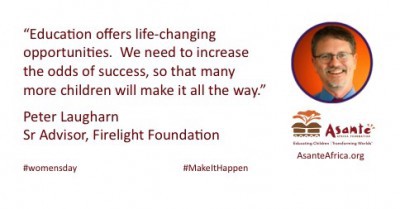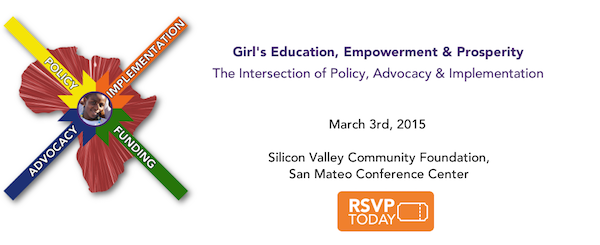In light of upcoming International Women’s Day, Asante Africa Foundation’s girls’ advancement work, and our March 3rd thought leadership event, we’ve been asking some of our panelists why they think girls’ advancement is important and what are some of the critical issues that need addressing.

Peter Laugharn, Senior Advisor at Firelight Foundation, an organization dedicated to investing in communities in Africa that support the health, resilience and education of children, will be one of our panelists. Peter has 25 years of foundation and nonprofit experience focused on improving child well-being in the developing world, particularly Africa, so he’s the perfect thought leader to help us understand policy, advocacy and implementation. We caught up with Peter to find out why girls’ advancement was particularly important for him, how he thinkings changes can be made and what we can do about it.
Why?
Why is girls’ education so important to you?
I have a personal interest in this region given that my wife Marie was born in rural Rwanda. Her parents, Madeleine Kagaju and Silas Sekimonyo, were determined to see that she and her siblings would get an education, even though the odds were against them and the path was long. She was one of only two young women in her university class. After graduating, she went to work for the United Nations in four African countries, helping improve health, education, good governance, and conflict resolution. This work brought the two of us together — we met working on a project to expand educational opportunity in central Africa.
Education offers life-changing opportunities. We need to increase the odds of success, so that many more children will make it all the way.
How?
How can changes be made?
In order for changes to be made in this region, there needs to be a good fit between supply and demand (that is, between governments and households):
- Governments provide schools, teachers, finance, and curricula.
- Parents decide if children should attend school, how hard they will be asked to work, how big their dreams can be, and if they will be supported to arrive at the finish line.
Governments and parents must work together if girls’ schooling through secondary is to become the norm in Africa. Organizations like Asante Africa Foundation can help both governments and parents play their roles more effectively.
What can we all do?
What is our role in this change?
We can’t leave girls’ advancement up to other people. There are small but effective things that we can all do to help.
- Commit to the global goal of all of the world’s children, girls and boys, getting a quality education at least through secondary school, which allows them to earn a decent living, by 2030.
- Be vocal about this commitment, find organizations that are advancing this agenda, and ask your network to engage with them.
- For those of us in Silicon Valley, make the great creativity of Bay Area education technology advances available to African education, in forms that are affordable, open source and adaptable, and work in environments with low bandwidth and unreliable electricity.
Don’t miss your opportunity to network with Peter and other thought leaders to delve deeper into the issue, tomorrow night.

Event Details
Date: Tuesday, March 3rd
Registration, Networking & Hors d’oeuvres: 5:00–6:00 pm
Welcome, Fireside Chat & Panel:6:00–8:30 pm
Close: 9pm
Venue: Silicon Valley Community Foundation Conference Center. 1300 South El Camino Real #100, San Mateo, CA 94402
